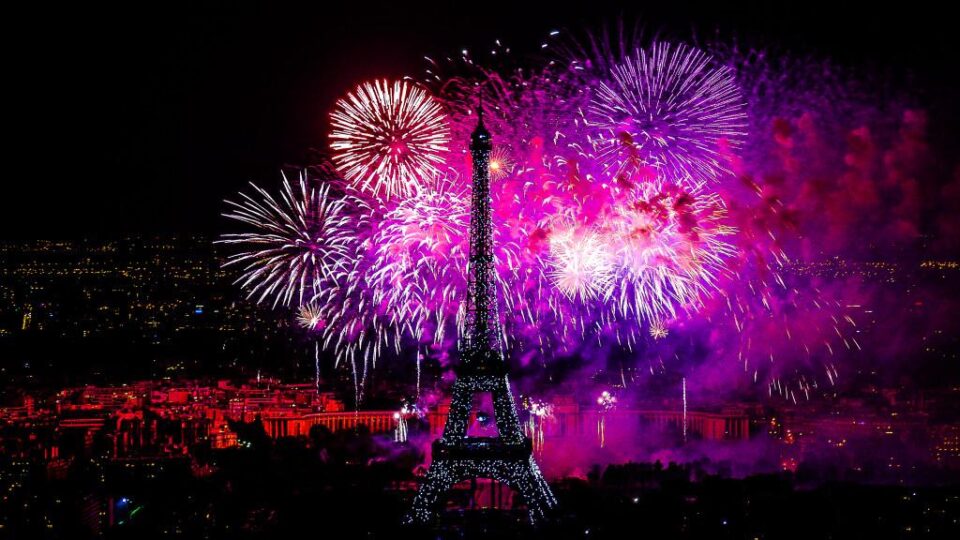Public Holidays in France
With the exception of Easter and associated Public Holidays, other public holidays in France are fixed, and many traditions surround the dates. Whether you live in France permanently or just visiting for a few days, this guide will guide you through all Public Holidays in France.
A Chronological List of the Bank Holidays in France
- 1 January, or Le Jour de L’an – the first day of the new year is a public holiday. A day for the family and for recovering from the excesses of the night before.
- Easter Sunday and Monday, or Le Dimanche de Pâques and le Lundi de Pâques. This a long weekend for the family. Not a fixed date; it changes annually.
- L’Ascension, this is the Thursday 40 days after Easter.
- Whitsun, or la Pentecôte. This is the 7th Sunday after Easter and is the first long weekend of the summer, with Whit Monday also a public holiday. It is celebrated with festivals around the country, and in the Provençal town of Apt in the Luberon, a Cavalcade, or carnival that dates back to the 1800s, is held from Friday through to Monday.
- 1 May, Labour Day, or la Fête du Travail – also known as la Fête du Muguet. This is because it is thought to be good luck to celebrate spring’s arrival by giving female friends and family members a small sprig of muguet, or lily of the valley flower.
- 8 May is a public holiday to celebrate Victory in Europe. It is known in France as la Fête de la Libération.
- 14 July, Bastille Day. This is the most famous and the most widely recognized these days as the National Day, or La Fête Nationale Française. The French Revolution’s historical links are celebrated in villages, towns, and cities throughout France with open-air concerts, fairgrounds, and fireworks.
- 15 August, The Feast of Assumption, or l’Assumption. A public holiday throughout the country and in Provence an additional time for celebration because it coincides with the date the allied forces landed on the shores of Provence in 1945.
- 1 November, All Saints Day, or Toussàint. A day to remember the dead. On this day, friends and relatives visit cemeteries with flowers, in particular chrysanthemums, to remember loved ones. Huge displays of these flowers of remembrance, in all colors, are a common sight in retail outlets at this time of year.
- 11 November, Armistice Day, or Armistice 1918. A formal day of remembrance for those killed in World War One and other conflicts. Memorial parades are held throughout the country, and wreaths of remembrance laid at monuments dedicated to those who gave their lives. The President of the Republic of France lays a wreath on the tomb of the Unknown Soldier, beneath the Arc de Triomphe on the Champs-élysées in Paris.
- 25 December, Christmas Day or le Jour de Nöel – a family day. Included in the celebrations are the bûche de Nöel, the Christmas Log, a decorated pâtissieurs cake.

Religious Festivals That Are Not Public Holidays in France
In addition to the bank holidays observed throughout France, there are a number of other celebrations and festivals. Among them are:
- Epiphany/Twelfth Night, or la Fête des Rois – 6 January. At this time of year, pâtisseries all over France produce les galettes des Rois, a sumptuous puff pastry cake filled with frangipan (almond paste) and topped with a golden paper crown. The Provençal version of this is a brioche ring flavored with essence of orange flowers and covered with the fruit confit that Apt is famous for. Both cakes contain a small plastic or ceramic figure, or a féve. The person who finds the féve when eating the cake is the ‘king’ or ‘queen’ for the day and wears the crown.
- Candlemass, or la Chandeleur, is held on 2nd February. It is traditional to eat pancakes or crêpes on this day.
- Shrove Tuesday or mardi gras on the 16th of February. Traditional to serve crêpes for supper and sugared fritters or bugnes in and around Lyon. Oreillettes are served farther South and are eaten between la fête de Rois and mardi gras.
- Good Friday or le Vendredi Saint is a church celebration, not a public holiday in France. This is not on a fixed date and changes every year.
- Midsummer’s Day, or la Saint-Jean, is 24th June and a time for celebration. Fêtes, parties, fireworks, and live music combine to make this a lively celebration for many.
- The Feast of the Immaculate Conception or la Fête de l’immaculée Conception is held on the 8th of December. Celebrated in Lyon by the famous spectacular fête de la Lumière, or festival of light. It is said to commemorate the Virgin Mary’s intervention to prevent the plague from reaching Lyon in the middle ages. During the celebrations, rows of candles are placed in colored jars outside windowsills throughout the city so that all the buildings in the city center are illuminated.
- Christmas Eve, 24th December, la Veille de Nöel. This is celebrated in Provence by the serving of the thirteen desserts before midnight mass.
- New Year’s Eve, la Saint Sylvestre. In France, new Year’s Ever celebrated with le Réveillon du Nouvel An. This is a New Years Party where copious amounts of champagne and foie gras are consumed.
